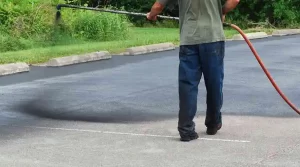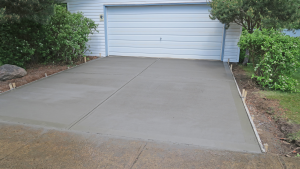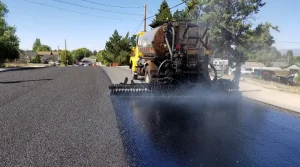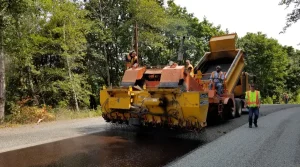This spring, ensure your parking lot stays functional and appealing by addressing common asphalt issues like potholes, cracks, and drainage problems. Proactive maintenance saves money and extends the life of your pavement.
Key Takeaway
- Inspect Early: Spring is the ideal time to assess asphalt damage caused by winter weather.
- Address Potholes Promptly: Delayed repairs lead to higher costs and increased damage.
- Seal Cracks to Prevent Potholes: Cracks left untreated often develop into potholes within three years.
- Combat Alligator Cracking: Regular upkeep prevents this severe, expensive issue.
- Maintain Line Striping: Fresh lines enhance curb appeal and improve parking lot safety.
- Check Catch Basins: Proper drainage is critical to avoid water damage and structural weakening.
Comprehensive Guide to Asphalt Repairs
Winter wreaks havoc on asphalt surfaces, leaving cracks, potholes, and other structural issues behind. Understanding the signs of wear and taking timely action can prevent costly damage and ensure a longer lifespan for your parking lot. Here’s a detailed guide on how to tackle common asphalt repair needs effectively.
Potholes: Addressing Hazardous Cavities
Potholes form when water penetrates the asphalt, freezes, and expands, causing structural failure. With the added stress of vehicle traffic, these holes worsen over time.
Why You Should Repair Potholes Quickly:
- Prevents further asphalt degradation.
- Reduces the risk of vehicle damage and accidents.
- Avoids escalating repair costs.
Repair Solutions:
- Cold Patch Repairs: Ideal for temporary fixes during colder months.
- Hot Mix Asphalt: A permanent solution best applied in warmer weather.
Crack Repairs: Essential for Long-Term Durability
Cracks are a precursor to more severe damage, often transforming into potholes if ignored. They are caused by asphalt oxidation, freeze-thaw cycles, and heavy traffic.
Crack Sealing Process:
- Preparation: Remove debris and clean the cracks thoroughly.
- Application: Fill the cracks with rubberized sealant at temperatures exceeding 375°F.
- Benefits: The sealant expands and contracts with the asphalt, preventing water infiltration.
Pro Tip: Regularly inspect your parking lot for cracks and address them promptly to save on future repairs.
Alligator Cracking: Tackling Fatigue Damage
Alligator cracking, named for its resemblance to reptile skin, is a severe form of asphalt degradation caused by repeated stress and inadequate maintenance.
How to Prevent Alligator Cracking:
- Ensure proper installation with a solid foundation.
- Regularly seal coat the surface to protect against oxidation.
- Fix minor cracks before they evolve into fatigue damage.
Repair Options:
- For small areas, patching can suffice.
- Severe cases may require full-depth reclamation or asphalt overlay.
Line Striping: Revitalizing Your Parking Lot
Faded parking lot lines compromise curb appeal and safety. Regular re-striping keeps your lot looking professional and ensures compliance with local regulations for ADA accessibility.
Line Striping Tips:
- Use high-quality, reflective paint for durability and visibility.
- Plan striping during dry weather to ensure proper adhesion.
- Reassess the layout for efficiency or to accommodate new traffic patterns.
Catch Basin Repairs: Ensuring Proper Drainage
Catch basins are essential for managing stormwater and preventing flooding in parking lots. Damage to catch basins often stems from water infiltration and freeze-thaw cycles, which weaken the structure.
Signs of Catch Basin Problems:
- Sunken or uneven areas around the drain.
- Water pooling instead of draining.
- Visible cracks or loose mortar in the basin structure.
Repair Methods:
- Partial Repairs: Replacing damaged components such as the frame or grate.
- Complete Rebuilds: Necessary for severe deterioration involving the surrounding asphalt.
Maintenance Tip: Regularly inspect and clean catch basins to prevent blockages and extend their lifespan.
Frequently Asked Questions (FAQs)
Q: How often should I inspect my parking lot for damage?
A: Perform inspections at least twice a year—once after winter and again in the fall. Additional checks after heavy storms or extreme weather events are also recommended.
Q: Can I delay repairs until warmer months?
A: While some repairs, like hot asphalt applications, are best suited for warm weather, temporary fixes can prevent further damage until permanent solutions are possible.
Q: How do I know if alligator cracking requires full-depth repair?
A: Full-depth repair is likely necessary if the cracking pattern extends over a large area and the subbase is compromised. A professional assessment is recommended.
Q: Is seal coating necessary for all asphalt surfaces?
A: Sealcoating is essential for prolonging asphalt life. It protects against oxidation, water damage, and UV rays and should be applied every 2–3 years.
Q: How much does it cost to repair a pothole?
A: Costs vary depending on the size and depth of the pothole. On average, repairs range from $50 to $150 per pothole for basic fixes, with more extensive damage requiring higher costs.
Q: Can I DIY minor asphalt repairs?
A: DIY repair kits are available for minor cracks and potholes. However, professional services ensure long-lasting results and address underlying issues.
Q: What is the freeze-thaw cycle, and how does it impact asphalt?
A: The freeze-thaw cycle occurs when water seeps into asphalt, freezes, and expands, causing cracks and structural damage. Repeated cycles worsen the deterioration.
Conclusion
Investing in asphalt repairs this spring is a cost-effective way to protect your parking lot from long-term damage. Whether filling potholes, sealing cracks, or maintaining catch basins, timely action ensures your asphalt remains safe, functional, and visually appealing. Don’t wait—schedule an inspection today and keep your pavement in top condition.
Looking for reliable and professional paving services in Jersey City? Look no further! Whether you need a new driveway, parking lot, or walkway, our expert team has you covered with top-quality craftsmanship and unbeatable customer service.
Don’t wait—call Jersey City’s best paving service today!







